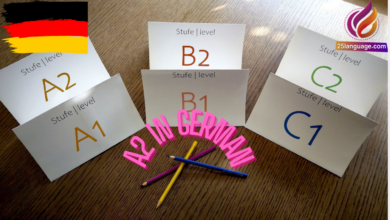Sentence Construction in German
Sentence Construction in German: the Predicate (Verb)

The sentence construction in German is a complex issue that would not fit into one single post. Thus, in this article I’m going to concentrate on the most important element: the predicate (in the following referred to just as “verb”).
The verb is in German the most important element because it structures the sentence. There are two types of sentences: main clause and dependent (subordinate) clause.
1. The main clause
In the main clause, the conjugated verb must always be in position 2 (meaning: the 2nd syntactic element), no matter what you put in the first position (never separated with a comma except ja/nein).
Examples
- Mein Hund heißt Ruki.
- Die Lehrerin steht an der Tafel.
- Um 8 Uhr gehe ich zum Unterricht.
4. Warum telefonierst du ständig?The only exception when the conjugated verb is in the first position of the sentence is
- in questions without a question word and
- in imperative/exclamative sentences.
Examples
- Heißt dein Hund Ruki?
- Telefoniere nicht ständig!
- Kommen Sie bitte morgen in meine Praxis.
- Ist das wieder heiß heute!
Other impersonal verb forms (infinitive, past participle) and the prefix of the separable verbs must be in the final position.
Satzbau Part I | Hauptsatz | German Sentence Structure
Examples
- Heinrich steht um 7 Uhr auf.
- Wir wollen morgen lange schlafen.
- Edgar ist gestern mit dem Zug angekommen.
- Wann hast du gestern zu Mittag gegessen?
This linguistic phenomenon that in German the conjugated verb is in position 2 and the impersonal verb form at the end is called Satzklammer (“sentence bracket”).
It is called “bracket” because these two verb forms (conjugated and impersonal) frame all the other syntactic elements (except what is in the first position).
2. The dependent clause
In the dependent or subordinate clause, the conjugated verb must always be in the final position of the sentence. Other impersonal verb forms (infinitive, past participle) are placed in the last but one position.
Examples
- (Heinrich kommt heute nicht,) weil er krank ist.
- (Die Lehrerin ärgert sich,) wenn jemand die Hausaufgaben nicht hat.
- (Wir suchen eine Lehrkraft,) die eine DaF-Fortbildung hat.
- (Helga denkt,) dass sie sehr gut singen kann.
- (Ich verstehe nicht,) warum du das gemacht hast.
In the case of separable verbs, the dependent clause is the only case where the prefix is not separated from the conjugated basis verb.
Examples
- (Heinrich ist immer müde,) weil er jeden Tag früh aufsteht.
- (Erklärst du mir,) wie man den Computer anmacht?
Important: dependent clause before main clause
In the examples above you can observe the main clause is always at the beginning of the complex sentence. But you can also start with a dependent clause putting the main clause at the end.
If we want to do so, we have to do an inversion in the main clause. The reason is the following: the whole dependent clause is occupying the first position you’ve have already read above.
For this reason, after the comma at the end of the dependent clause, you have to write the verb of the main clause and after this the subject.
In this order, the verbs of the dependent clause and of the main clause are together separated by a comma.
Examples
- Da (=Weil) Heinrich krank ist, kommt er heute nicht.
- Wenn jemand die Hausaufgaben nicht hat, ärgert die Lehrerin sich.
At last you know about The sentence construction in German .




























